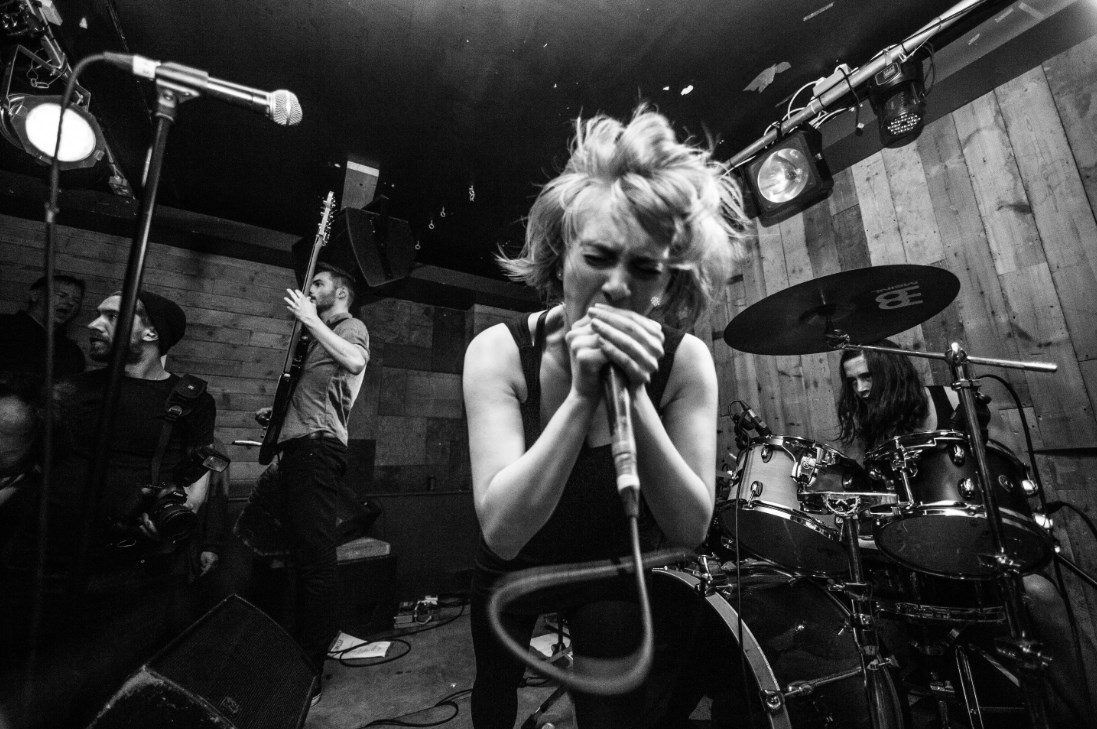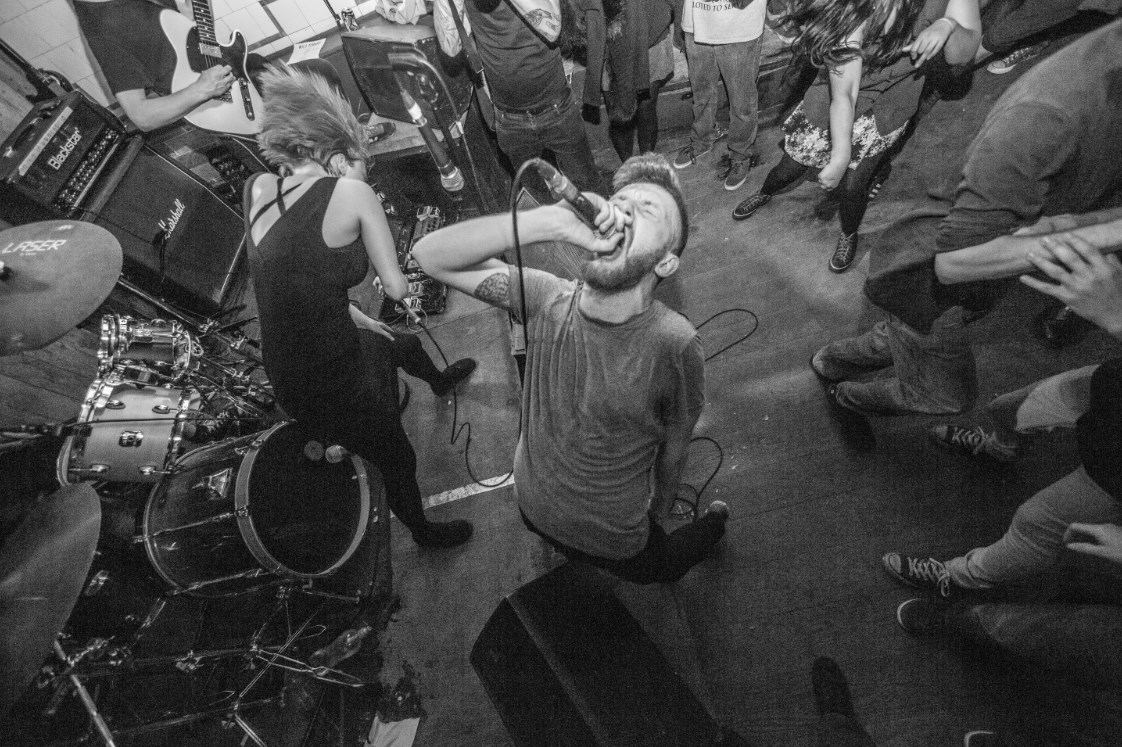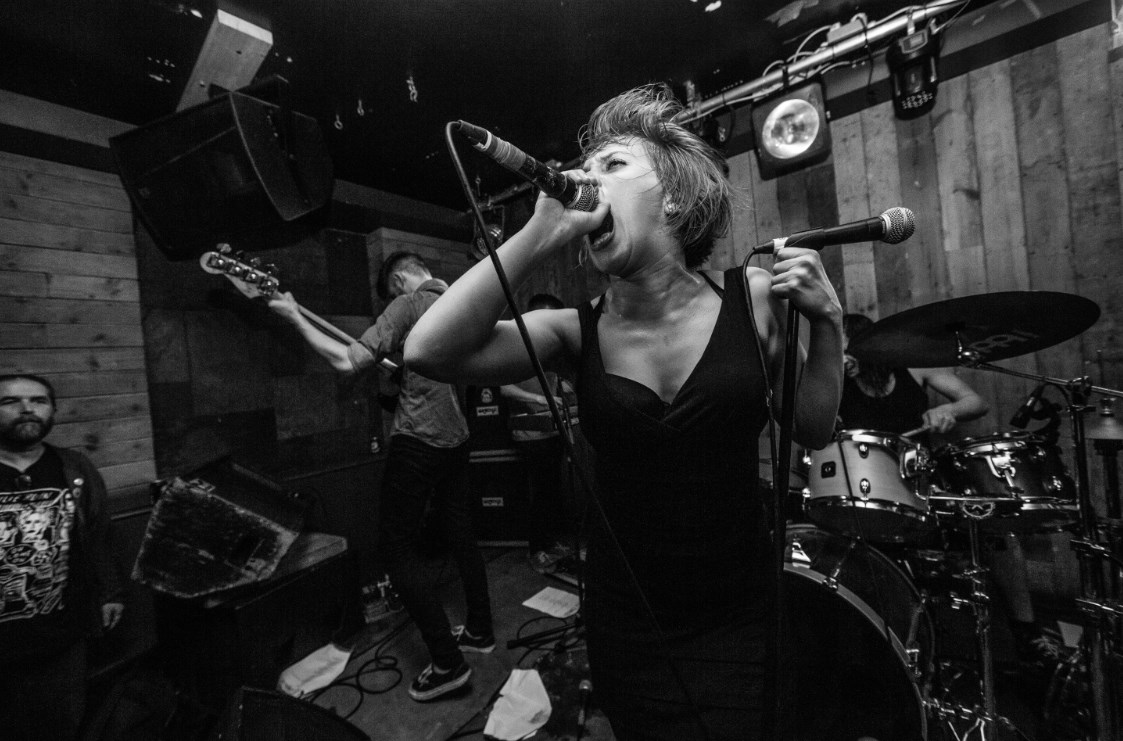|

Photography: Jake Lewis
Leg three of Rolo Tomassi’s ‘Grievances’ release celebration is in merciless swing. Eva and James Spence are in the crowd, their bodies further stoking a pit that might have received pass marks at a CBGB matinee 30 years ago. The song is The Embers, a snotty, explosive cut from the top end of the new album that is greeted like an old, if unpredictable, friend by those packed inside the subterranean Waiting Room in Stoke Newington. At the start of the year, the band turned 10. They look good on it.
A few hours earlier, the scene is more reserved. In the gastropubby surroundings above the venue, James Spence, bassist Nathan Fairweather and drummer Tom Pitts discuss an album that stands as the most rounded and considered of their career. It’s strange to describe anything Rolo Tomassi do as refined, given the violence and unpredictability of their music, but that’s just what it is.
“I think it’s the culmination of a search for identity,” Spence says. “In the past it’s been five people pulling separately to try and create something. Sometimes that does work, and it would create the schizophrenic signature sound that we built our name on initially. Now, everyone’s pulling in a really similar direction and has a really similar idea of what they want the band to sound like. They know the contribution they can make to that.”
As a whole, ‘Grievances’ flows. Many of its songs are bookended by instrumental passages, where James Spence’s propensity for synth experimentation has been replaced with a more organic slate of sounds. There are lone piano notes and mournful strings, while Unseen and Unknown allows Chris Cayford to indulge in a short, Once Upon A Time In The West-style guitar break. These moments give added urgency to tracks that would still be gut-wrenchingly powerful as standalone pieces.
“With this record, contrastingly, everything keyboard-wise was written on a piano,” he says. “I wrote everything with a very natural sound to begin with. In the past, I’d mess around with synthesizers and stuff, but you’re always relying on the sound the instrument is making rather than what you’re playing. As soon as I started writing on piano, I was coming up with melodies that had to work on the piano itself. I was listening to more contemporary classical music as well, which was a big influence on the decision to add strings to it. It was just a want of doing something different, something outside our comfort zone. It definitely fit the sound palette of the rest of the material.

“Some of the songs were written to go next to one another. There are certain motifs that appear in tracks that follow on in a second track. With the interludes, they were definitely written with the sequencing of the record in mind. The bulk of the songs were separate. We wrote a handful that we knew would work in any live setting, be it the basement of a pub or a considerably bigger venue. We built up a record around that, then thought about the sequencing of it and how we could present it as one movement of music, rather than a collection of songs.”
Live, of course, is where the picture crystallises further. Rolo Tomassi’s appetite for road work is well documented, but 2014 represented a fallow year. For reasons both personal and band-related, shows weren’t part of the discussion for a while. The extended break eventually became the ace up the new album’s sleeve, allowing the quintet to avoid the fate that awaited them while recording ‘Astraea’. Sessions with Lewis Johns, at The Ranch Production House near Southampton, were ordinary in the best possible sense of the word.
“We’ve been doing it for that long that we now know how to work efficiently,” Spence says. “Having a lot of time off from playing and touring last year, as irritating as it was at the time, definitely helped us get into the mindset of writing a record and fully immersing ourselves in that.
"In the past, writing has been a rushed process so we could get back out and carry on playing shows. For various reasons we just weren’t able to do that this time around and it made for a much more coherent record. It was a very conventional studio experience, exactly what we needed on the back of making a quite difficult and disparate third album.”
By way of contrast, the record’s lyric sheet is desolate; dark in a genuine sense. Nothing about ‘Grievances’ is geared to an easy pull quote, and the arrangements have a reflective element to them as a result. Its quieter sections sustain the emotional burden and atmosphere, just as the more visceral exchanges give form to the record’s rage. Late in the piece, All That Has Gone Before encapsulates the dynamic. Eva Spence delivers the record’s killer line both as a full-throated roar and a soaring melody: “We can’t be loved as we are.”

“The music’s always been hyper-dynamic,” James Spence continues. “It’s just a case of making it more focused and considered, using things like strings and piano, thinking of the way the record as a whole works dynamically rather than song by song. There were certain bits of the music that were written with vocals in mind and sections of the record where we’d really open it up and let Eva sing cleanly for passages. We didn’t want any of the refrains to feel tacked on. It had to move naturally.”
By the time they hit the tiny stage at the Waiting Room, they’ve clearly worked off any ring rust. Fairweather and Pitts are watertight, sending each time signature jump thudding into chests. James Spence pogos behind his rack of synths. Eva remains the dynamic focal point, a blur of controlled fury and punishing physicality. At the end of the evening, she’ll pull glass from her leg.
It’s a performance that reminds you just how good Rolo Tomassi have been in the past, while also displaying the unreal live proposition they are now. The new material not only sounds at home in their set, but outpunches some bankers from years gone by. Faith No More, whom they open for at the Roundhouse this month, have their work cut out.
“It’s been quite nice putting it in the context of the other material, trying to build something similar to the record in a live environment,” James Spence adds. “The sequencing of the set and the thought that goes into that, how the tracks complement each other and how the new material brings some of the older material to life. You hear it in a different context.”
Picking up the thread, Pitts has one idea in mind. It’s one that can scream desperation in certain contexts, but on this occasion makes perfect, exciting sense. “I really want to play the whole thing,” he says. “When we play the first track, I instantly want to go into the second. We’re going to have to discuss that.”
Huw Baines is editor of Stereoboard. You can find him on Twitter.
Head here to see more awesome work by Jake Lewis.
NOTE FROM THE EDITOR
We don't run any advertising! Our editorial content is solely funded by lovely people like yourself using Stereoboard's listings when buying tickets for live events. To keep supporting us, next time you're looking for concert, festival, sport or theatre tickets, please search for "Stereoboard". It costs you nothing, you may find a better price than the usual outlets, and save yourself from waiting in an endless queue on Friday mornings as we list ALL available sellers!
Let Us Know Your Thoughts
Related News |
No related news to show